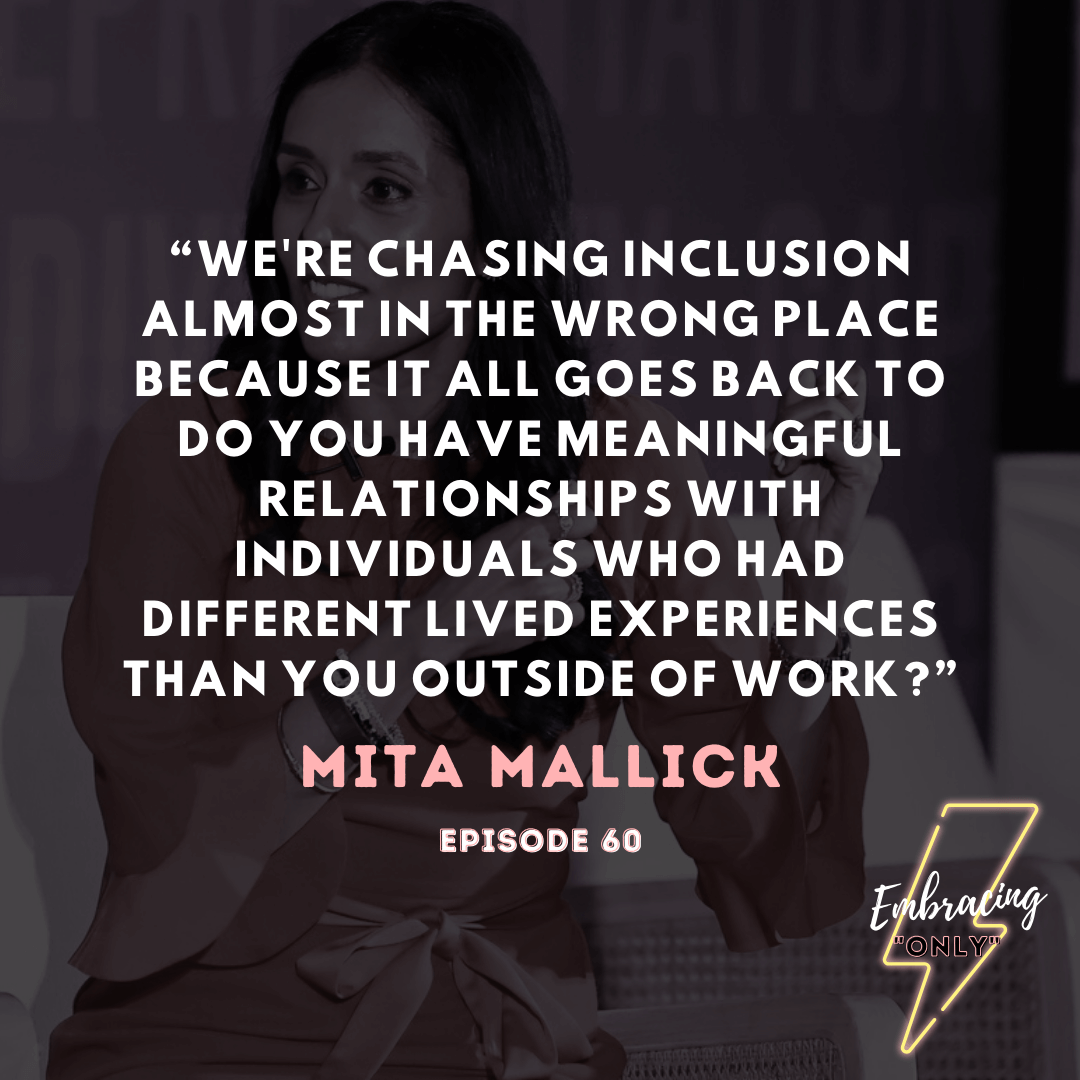Debunking Corporate Myths to Transform Your Workplace
In this blog post and podcast episode Mita Mallick shares her personal experiences and insights on building cultural intelligence, getting your voice heard, the concept of family in the workplace, hiring and advocating for diverse talent, and finding balance as a DEI professional.
Mita is a trailblazing leader and best-selling author who is renowned for her transformative impact in the corporate world – particularly at Unilever where she pioneered inclusive practices.
Listen to the episode or scroll down to read the blog post ↓
Mita’s powerful story, shaped by her upbringing as the daughter of Indian immigrants in the U. S., underlines her commitment to giving a voice to diverse perspectives.
In this blog post, we’re covering the following:
Click here to listen on Apple Podcasts. While you're there, subscribe and leave us a rating and review if you enjoy the episodes.
1) Building Cultural Intelligence and Minimizing Workplace Prejudice
Mita shares an interaction she had with a white woman at work. She was living in Manhattan at the time and the other woman lived in Connecticut, yet she was convinced that Mita should know her dentist, Dr. Raj. And every day they would have the same conversation.
Mita then explains the difference between intention and impact.
“What were her intentions? She wanted to create some sort of connection or relationship with me. Yet the impact was that I felt tokenized every day” - Mita Mallick
Mita refers to this as the burden of educating constantly.
“It's not the burden of black and brown individuals from historically marginalized communities to drive education for the entire company every single day.” - Mita Mallick
Mita explains that this work starts at home, it doesn’t start at the conference room table.
“We're chasing inclusion almost in the wrong place because it all goes back to: Do you have meaningful relationships with individuals who have different lived experiences than you outside of work?” - Mita Mallick
2) Speaking Up is Not Enough
Mita emphasizes that speaking up is not enough.
“How many times have I been given a seat at the table, but my voice doesn't actually matter? I've been invited to meetings and I've shared these stories where I've actually been told to sit in the back.” - Mita Mallick
Mita explains that just because you let everyone speak, doesn’t make you an inclusive leader. It goes beyond that. We need to also focus on creating psychological safety.
According to her, if you let someone speak but also shut them down when you don’t agree with them, steal their ideas and claim them as your own, or dismiss their opinions, you’re not being inclusive.
Mita refers to herself as an introvert or a quiet leader and then challenges us to also think of the people in our workplace and how they operate.
“Have we thought about the balance of how people receive information and how they like to communicate? Are you thinking about that as a leader or do you expect everyone just to adjust to your style?” - Mita Mallick
3) Ensuring Your Voice Gets Heard
You’re in the room. Now what?
Mita explains with brilliance during episode 60 of Embracing “Only” that you have to show people that you have earned your seat at the table, especially if you feel you were a tokenistic invite.
What this means to Mita, is being prepared.
She is often the first one to raise her hand after a presentation. She encourages other women of color to do the same as it helps to build confidence.
Her advice is to go over the meeting topic beforehand and have questions or thoughts prepared, so when the time comes, your hand is the first one up in the air.
“You hired me for my expertise and genius and here it is. And so I have to be willing to speak up in the meeting.” - Mita Mallick
This can also be in written form after the meeting, Mita explains.
How?
Over Slack, email, or a shared document if that’s the case.
Mita shares a memory of when she was invited to a meeting and she felt she had no business being in that room. A colleague then said something that would forever change her mindset.
“The vice president invited you for a reason. Don't disappoint her. She invited you because she knows you have something to contribute.”
YOU were also hired for a reason. You have a responsibility to share thoughts and ideas.
“ And I think once you do it over and over again [...] it just becomes easier.” - Mita Mallick
4) The Concept of Family in The Workplace
There is a common analogy of your colleagues being like your family which Mita struggles with, and we had to go there during this interview.
“I've bought into it over the years and then I bought out of it. I don't fire my family. I don't lay them off.” - Mita Mallick
Mita explains that this analogy doesn’t hold in a capitalistic society where profit and revenue are the goals.
“I respect that as a business person, you have to control costs and you have to make hard choices. Many of us have had to do that this year, but that's not family then. So we need to find another analogy for it. I don't believe the family analogy works. I think it can be really harmful.” - Mita Mallick
Mita furthers this by saying that the word family can be weaponized especially if you’re early on in your career.
But on the other hand, she understands the importance of caring for your team (and showing you care).
They’re part of your day, you may truly love them, but according to her, it’s a very different relationship. It’s not like your kids, your husband, your wife, your parents, or your in-laws.
Mita then briefly explains the 2 reasons why this language is used:
1. From the leadership side
“Leaders want to use that language because we rally around it to create community. We haven't found another language.”
2. From the employee side
“People are feeling lonely post the pandemic. Their ties to communities are being cut. They're worshiping less. They show up at work and they expect a lot from their employer. So they almost expect the employer to fill in for family.” - Mita Mallick
5) Assessing Performance And Hiring Diverse Talent
Mita shares that she has been called a diversity hire. “In response I say, I earned this seat.”
She emphasizes that language matters.
“When we say things like I'm all for diverse talent as long as they're good [...] one of the things I encourage people to do is ask open-ended questions. Well, tell me more. What do you mean by that? You mentioned that she's not a cultural fit, could you give me some examples?” - Mita Mallick
Mita has even heard people say they don’t know if they would trust her to watch their kids.
But what does that have to do with the workplace?
This means people in leadership positions are basing decisions on feelings.
Mita proposes we focus on the facts.
“Facts, not feelings. We all have a lot of feelings. Let's go back to the facts. So here we are talking about performance review. You mentioned being a cultural fit. Can we go back to what were her objectives? What were the results this year versus what we asked her to do? And has she exceeded them or has she not? Let's go back to the facts.” - Mita Mallick
Mita explains that through self-reflection, people may begin to realize that they’re talking about their feelings rather than the facts.
“If you get people to self-reflect with open-ended questions, they sometimes get there on their own. It doesn't always happen in the first conversation, but the more you do it and the more you practice as a team, you'll start to see people might pause because they realize that they're actually talking about their own personal feelings versus the facts of the situation. .” - Mita Mallick
6) Finding Balance in DEI
Sometimes the problem is not having access to enough lived experiences that aren't your own, that’s when you don't believe these things are happening in the workplace.
Mita furthers this by saying that we want to relate and we want to problem solve these issues.
Everyone has different lived experiences.
“You might think I'm being sensitive and exploding today, but there's been a whole litany of things that I just have buried or haven't talked about.” - Mita Mallick
Mita emphasized the importance of having access to people from different communities to understand what they are going through.
“It's like the head and the heart. Sure, you can show people statistics with the head. But the heart says I actually really care about this now because I have a colleague who's experienced this and now I'm more attuned to it.” - Mita Mallick
How much time should you spend trying to share different experiences with people in the hope that everyone can just get along?
As a Chief Diversity Officer, Mita explains that she has more conversations than she wants to on this but that is because this is the work she has chosen.
“How I choose to spend my time on the weekends and evenings as a woman of color, I can create those boundaries.” - Mita Mallick
To hear the full conversation, scroll all the way up and tune into episode 60.
About The Hosts: Olivia And Archita
OLIVIA
Olivia Grant Cream is the host and producer of the Embracing Only podcast. Nothing makes her happier than providing a platform to women who are changing the world.
Olivia is a proud US Veteran and HR Leader who is passionate about changing the face of corporate America by helping underrepresented people reclaim their power and live the life of their dreams.
She is an advocate for transitioning military members seeking second careers in the corporate landscape.
Olivia is a proud Jamaican and enjoys mentoring, coaching, classic cars, and nature. way you tell your story online can make all the difference.
→ You can work with Olivia here: www.oliviacream.com
→ Book her as a keynote speaker or moderator for your next ERG or company event.
ARCHITA
Archita Sivakumar Fritz is the Host and Producer of the Embracing Only podcast. Archita is an international executive, who has lived and worked in India, the U.S., Canada, and Germany.
She is the founder, principal of Ready Set Bold a workplace transformation firm that supports F500 to startups on their product, people and process transformation journey.
She is a fierce advocate for canceling the culture around the silence of bullying and harassment in the workplace through her work with Speak Out Revolution. She lives in Dusseldorf, Germany with her husband where they are raising their three third-culture kids.
→ If you want to work with Archita you can reach out to her here: www.readysetbold.com.
→ Book her as a speaker, moderator, or coach for your next company event or workshop.




